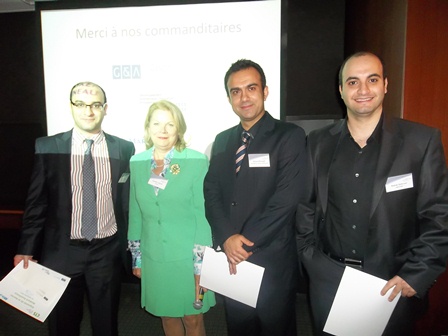
Roozbeh Safavieh and Tohid Fatanat, both PhD candidates at McGill University in Biomedical Engineering, along with team members Ehsan Derayati from Concordia University, and Babak Safavieh from the Institut national de la recherche scientifique (INRS) Energy, Materials and Telecommunications program were part of a multidisciplinary team that won the 2012 Medtech Challenge Excellence Scholarship award for their project entitled “Low cost microchip for point of care high sensitive assays.”
The Medtech Challenge was created to engage students interested in medical technology entrepreneurship. It offers them the opportunity to present and discuss their ideas, and to receive feedback from industry experts and other entrepreneurs. The event is organized annually by Campus des technologies de la santé (CTS) and Mitacs, with the support of the Ministry of Finance and Economy (MFE) and legal firms, Fasken Martineau and Gascon & Associates. Together, they contribute cash and gifts-in-kind totalling $21,000 in value, to be used by the winners for further product development.
The business project of the team primarily involves design, production and marketing of a low cost microchip and its associated reader for rapid differential diagnosis of disease states. In addition to healthcare sector, this microchip technology has the potential to be utilized in different functional areas such as environmental and food sections. The very small size of the microchip (2cm by 2cm) and its low cost of manufacturing make it a very convenient and easy to use for different diagnostic disease applications.
The primary application of this microchip is designed as a diagnosis tool of four cardiac biomarkers. By using only 10 µl of whole blood sample of the patient, this technology reaches the expected turnaround time of 15 minutes from applying the blood sample to get the results of the disease states.
The members of the team envision huge opportunities for their product development and success at the near future. They do strongly believe that providing this very innovative, flexible and cost efficient technology can be a great step ahead in world of point of care diagnosis, which will provide great benefit for hospitals, physicians, researchers and patients.
The innovative low cost microchip was developed by Prof. David Juncker and Roozbeh Safavieh. “The operation of the microfluidic chip is encoded into the structure, which provides simultaneously the energy to drive the fluids and the flow control. The chip circumvents the need for bulky and costly peripherals and is entirely self-powered and self-regulated. The commercial advantage thus stems from the combination of advanced liquid handling capability with very low manufacturing and operation costs that give it a major commercial advantage compared to current products available in the market”.
To read more about the award click here (in French)
November 7, 2012
